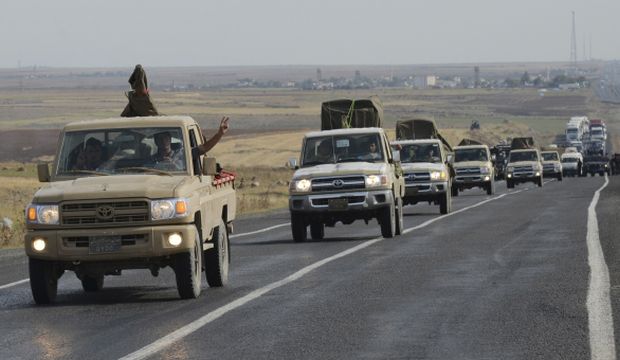
A convoy of Peshmerga vehicles makes its way to the Turkish-Syrian border, near the town of Kiziltepe, in the southeastern Mardin province, on October 29, 2014. (REUTERS/Stringer)
Kobani, on the border with Turkey, has been encircled by the Sunni Muslim insurgents for more than 40 days. Weeks of US-led air strikes have failed to break their stranglehold, and Kurds are hoping the arrival of the Peshmerga will turn the tide.
The siege of Kobani—known in Arabic as Ayn Al-Arab—has become a test of the US-led coalition’s ability to stop ISIS’s advance, and Washington has welcomed the Peshmerga’s deployment.
A first contingent of about 10 Peshmerga fighters crossed into Kobani from Turkey, the Britain-based Syrian Observatory for Human Rights said. Kurdish and Turkish officials said a larger deployment was expected within hours.
“That initial group, I was told, is here to carry out the planning for our strategy going forward,” said Meryem Kobane, a commander with the People’s Protection Units (YPG), the main Syrian Kurdish armed group defending the town.
“They need to make preparations so the Peshmerga will be positioned according to our needs,” she told Reuters.
Around 100 peshmerga fighters arrived by plane in southeastern Turkey on Wednesday, joined later that night by a land convoy of vehicles carrying heavy weapons including a cannon and truck-mounted high-caliber machine guns.
In a compound protected by Turkish security forces near the border town of Sur, the fighters were donning combat fatigues and preparing their weapons, a Reuters correspondent said.
Iraqi Kurdistan President Mason Barani said his region was prepared to deploy more forces to Kobani if asked.
“Whenever the situation on the ground necessitates and more forces are requested from us and there is passage for them, we will send more forces to protect Kobani and defeat terrorists in Western Kurdistan,” he said in a statement.
ISIS has caused international alarm by capturing large expanses of Iraq and Syria, declaring an Islamic “caliphate” that erases borders between the two.
Its fighters have slaughtered or driven away Shi’ite Muslims, Christians and other communities who do not share their ultra-radical brand of Sunni Islam.
The United States and its allies in the coalition have made clear they do not plan to send troops to fight ISIS in Syria or Iraq, but they need fighters on the ground to capitalize on their air strikes.
Syrian Kurds have called for the international community to provide them with heavier weapons and munitions and they have received an air drop from the United States.
But Turkey accuses Kurdish groups in Kobani of links to the militant Kurdistan Workers’ Party (PKK), which has fought a three-decade insurgency against the Turkish state and is regarded as a terrorist group by Ankara, Washington and the European Union.
That has complicated efforts to provide aid.
The Kurdish fighters were given a heroes’ welcome as their convoy of jeeps and flatbed trucks snaked its way for around 250 miles (400 km) through Turkey’s mostly Kurdish southeast on Wednesday.
A senior Turkish government official said Turkey—which has refused to send its own troops across the border to confront ISIS—welcomed the Peshmerga’s arrival and said that the rest of contingent that arrived in Turkey was expected to enter Kobani later on Thursday.
